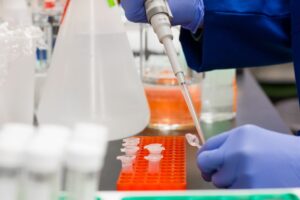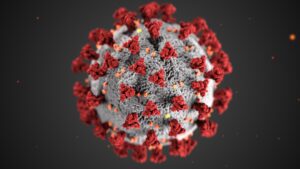(UPDATED) The US has thrown its support behind an initiative at the World Trade Organization (WTO) to temporarily waive intellectual property rights in response to the Covid-19 pandemic. Late April rich members of the WTO, including the US, were still blocking the proposal backed by developing countries to suspend these rights for the production of Covid vaccines.

But yesterday, the Biden administration announced it will support the idea. In a statement, US trade representative Katherine Tai wrote: “This is a global health crisis, and the extraordinary circumstances of the COVID-19 pandemic call for extraordinary measures. The Administration believes strongly in intellectual property protections, but in service of ending this pandemic, supports the waiver of those protections for COVID-19 vaccines. We will actively participate in text-based negotiations at the World Trade Organization (WTO) needed to make that happen. Those negotiations will take time given the consensus-based nature of the institution and the complexity of the issues involved.
The Administration’s aim is to get as many safe and effective vaccines to as many people as fast as possible. As our vaccine supply for the American people is secured, the Administration will continue to ramp up its efforts – working with the private sector and all possible partners – to expand vaccine manufacturing and distribution. It will also work to increase the raw materials needed to produce those vaccines”, the statement added.
The proposal (IP/C/W/669) was initially submitted by South Africa and India and has since been co-sponsored by Kenya, Eswatini, Mozambique, Pakistan, Bolivia, Venezuela, Mongolia, Zimbabwe, Egypt, the African Group, the Least Developed Countries (LDC) Group, and most recently Maldives, Fiji and Namibia — a total of 60 WTO members.
But, as the WTO explained on its website last month, members “remain divided on the fundamental discussion about the impact of IP protection in ensuring rapid and safe access to vaccines and other medical products. Co-sponsors were of the view that the current challenges posed by the pandemic can only be effectively addressed by waiving certain TRIPS obligations. A number of delegations remained unconvinced about the necessity for a waiver at the international level, with some members arguing that a waiver might be counterproductive and undermine ongoing collaborative efforts.”
Among the latter were Western countries including Britain, Switzerland, EU member states and the United States. Yesterday, the World Health Organization’s director-general, Tedros Adhanom Ghebreyesus, praised the US’ change of mind as a “monumental moment in the fight against Covid-19” that reflects the leadership of the White House “to address global health challenges”.
Safety
The main argument against a waiver of patent rights has been that IP isn’t the barrier for making available vaccines for people worldwide, but scaling up manufacturing is.
This point was made last month as well by billionaire Bill Gates, whose foundation has been very active in the fight against Covid-19. In an interview with Sky News, he said that what’s holding back a global vaccine rollout is “is not intellectual property. It’s not like there’s some idle vaccine factory, with regulatory approval, that makes magically safe vaccines. You know, you’ve got to do the trial on these things. Every manufacturing process needs to be looked at in a very careful way” and “there’s only so many vaccine factories in the world and people are very serious about the safety of vaccines.”
According to Gates, pharmaceutical companies are not refusing to share COVID-19 vaccine formulas. “We got all the rights from the vaccine companies,” he said. “They didn’t hold it back, they were participating.”
Gates’ arguments failed to convince Joseph Stiglitz, former winner of the Nobel Prize for Economics, and people such as former democratic presidential candidate Bernie Sanders, who called a waiver of coronavirus-related patent protections a matter of “common sense and morality.” Aid organization Oxfam International accused the US, UK and EU of “blocking proposals at WTO to help poorer countries get vaccines more quickly.”
But the website Health Policy Watch followed a March summit of top pharma and public health sector players, where Covid-19 vaccine supply bottlenecks were addressed. The difficulties of knowledge transfer and increasing production were an important issue.
Health Policy Watch quoted Richard Hatchett of the Coalition for Epidemic Preparedness (CEPI) as saying: “Companies are beginning to report shortages of critical raw materials, critical consumables, even equipment, that is necessary for vaccine manufacturing.”
Rajinder Suri of the Developing Countries Vaccine Manufacturer’s Network (DCVMN) explained: “Unlike pharmaceuticals which are chemistry-based products, the complexities of biological vaccine operations are still of higher challenge. (…) at the drug substance level itself, there are several complexities (…), whether it is in terms of platform technology; whether it is in the form of capacity (…). And then, matching the scaling up of the facility, whether in terms of fill and finish, or final product.”
In reaction to the news from the Biden administration, Ellen ‘t Hoen of Medicines Law & Policy, acknowledged there are serious obstacles for increasing the production of covid vaccines. Still, she said a waiver is a very important step. On Dutch radio ‘t Hoen pointed out that at the WTO consensus is needed for the proposal, but she is optimistic: “In these kinds of issues the US and EU are usually opposed. If one of them changes its mind, this can quickly yield results.” This morning, there was no reaction yet from the European Union or other opponents of the waiver.

Criticism of big pharma had increased over the last months, more particularly of some companies which are profiting enormously from the Covid pandemic, while parts of the world are in absolute distress. Last week, Pfizer announced its vaccine generated revenues of almost 3 billion euros in the first three months of 2021 and is expected to hit 21 billion euros this year, accounting for more than one third of Pfizer’s sales. The company said it was expecting durable demand for the vaccine, in a similar way to flu vaccines. As the BBC commented in an analysis: “Unlike rivals Astra Zeneca and Johnson & Johnson which vowed to forego profits on the vaccine during the pandemic, Pfizer planned to make money on its vaccines. Tuesday’s results show just how much.”
In an article by Politico, Matthew Kavanagh of Georgetown University’s O’Neill Institute for National and Global Health Law commented on the situation. He said that thinking developing or middle-income countries don’t have the technical ability to produce the Covid-19 vaccines is a “pretty racist way to think about the world,” (…) “And [it’s] remarkably convenient for companies to claim that they are not the barrier [and] that instead … the technical capacity doesn’t exist.” According to Politico, Kavanagh said that the IP waiver were to happen, it would redirect some production flows towards middle-income countries with burgeoning or highly-developed pharmaceutical industries, such as India, Egypt and Morocco.
This article was updated on 6 May 2021 to include the news that the US Administration now backs a waiver of patent rights.
_____________________________
To make sure you do not miss out on regular updates from the Kluwer Patent Blog, please subscribe here.
Kluwer IP Law
The 2022 Future Ready Lawyer survey showed that 79% of lawyers think that the importance of legal technology will increase for next year. With Kluwer IP Law you can navigate the increasingly global practice of IP law with specialized, local and cross-border information and tools from every preferred location. Are you, as an IP professional, ready for the future?
Learn how Kluwer IP Law can support you.



What all politicians propose is certainly a start on the way to more vaccines. Patents are one aspect of the problem and the legislator can well impose compulsory licensing. But what about the know-how and technology going on a par with the patents?
The legislator is powerless for the second aspect and it is not by deciding compulsory licensing today that tomorrow we will have more vaccines.
This does not mean that a start should be dismissed at once, but it is a very partial view of the whole problem.
Politicians often have very strong views on topics for which they do not have the faintest idea. And the influence of lobbyists, from whichever side is not to be neglected.
It is also a fallacy of the Western world to think that it can master the pandemic by vaccinating its population. The problem is global and only a global solution will help overcoming the pandemic.
Rather than starting a discussion on patents it would be much better to manufacture more vaccines and simply cover the cost for their manufacture. This would be much quicker.
“The legislator is powerless for the second aspect and it is not by deciding compulsory licensing today that tomorrow we will have more vaccines.”
Requisition in times of war maybe?
https://www.nationalarchives.gov.uk/help-with-your-research/research-guides/land-requisitioned-war/
I’ll start by confirming that I have no idea what technology goes into modern vaccine production. It does seem strange, however that in the countries in which big pharma are present, and would presumably have the strongest patent protection, the patent system does not seem to have been a hindrance in the development, manufacture and distribution of several different vaccines. Is there the slightest piece of evidence to show that patents are delaying the vaccination drive?